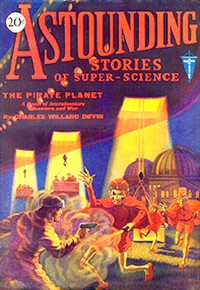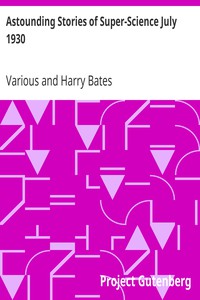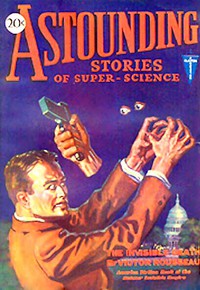Astounding Stories of Super-Science, November, 1930 by Various (spanish books to read .TXT) 📖

- Author: Various
Book online «Astounding Stories of Super-Science, November, 1930 by Various (spanish books to read .TXT) 📖». Author Various
By some tacit compact, the guards who had annually brought their victims to be devoured had been unmolested, the vast wall of semi-human shapes withdrawing into the shelter of the surrounding forests while the Chinese were staked out in rows. Death, which would have been a mercy, had been denied them. It was living flesh that the Earth Giants craved. And here, on the spot known as Golgotha, the hideous sacrifice had been annually repeated.
That first year, when the chosen victims were transported to the fatal spot, all America went mad. Frenzied parents attacked the offices of the Federation in every city. The cry was raised that Spanish Americans had been selected in preference to those of more northern blood. Civil war loomed imminent.
And year after year these scenes must be repeated. Boys and girls, from fifteen to twenty years of age, the flower of the Federation, a hundred thousand of them, must die a hideous death to save humanity. Now the choice of the second year's victims was at hand.
In their laboratory, removed to the heart of the Adirondacks wilderness, Cliff and Kay were working frantically.
"It's the last chance, Kay," said Cliff. "If I've not solved the secret this time, it means another year's delay. The secret of dissolving organic forms as well as inorganic ones! What is this mysterious power that enables organic forms to withstand the terrific bombardment of the W-ray?"
The W-ray was the Millikan cosmic ray, imprisoned and adapted for human use. It was a million times more powerful than the highest known voltage of electricity. Beneath it, even the diamond, the hardest substance known, dissolved into a puff of dust; and yet the most fragile plant growth remained unaffected.

he laboratory in the Adirondacks was open at one end. Here, against a background of big forest trees, a curious medley of substances had been assembled: old chairs, a couple of broken-down airplanes, a large disused dynamo, a heap of discarded clothing, a miscellany of kitchen utensils on a table, a gas stove, and a heap of metal junk of all kinds. The place looked, in fact, like a junk heap.
The great top was set in a socket in a heavy bar of craolite, the new metal that combined the utmost tensile strength with complete infusibility, even in the electric furnace. About six feet in height, it looked like nothing but what it was, a gyroscope in gimbals, with a long and extremely narrow slit extending all around the cen[155]tral bulge, but closed on the operator's side by a sliding cover of the same craolite.
Within this top, which, by its motion, generated a field of electrical force between the arms of an interior magnet, the W-rays were generated in accordance with a secret formula; the speed of gyration, exceeding anything known on earth, multiplied their force a billionfold, converting them to wave-lengths shorter than the shortest known to physical science. Like all great inventions, the top was of the simplest construction.
"Well," said Cliff, "you'd better bring out Susie."
Kay left the laboratory and went to the cabin beside the lake that the two men occupied. From her box in front of the stove a lady porcupine looked up lazily and grunted. Kay raised the porcupine; in the box, of course. Susie was constitutionally indolent, but one does not handle porcupines, however smooth their quills may lie.
Kay brought her to the heap of junk and placed the box on top of it. He went inside the laboratory. "I may as well tell you, Cliff. I wouldn't have brought Susie if I'd thought the experiment had the least chance of success," he said.
Cliff said nothing. He was bending over the wheel, adjusting a micrometer. "All ready, Kay?" he asked.

ay nodded and stepped back. He swallowed hard. He hated sacrificing Susie to the cause of science; he almost hoped the experiment would fail.
Cliff pressed a lever, and slowly the ponderous top began to revolve upon its axis. Faster, faster, till it was nothing but a blur. Faster yet, until only its outlines were visible. Cliff pressed a lever on the other side.
Nothing happened apparently, except for a cloudy appearance of the air at the open end of the laboratory. Cliff touched a foot lever. The top began to grow visible, its rotations could be seen; it ran slower, began to come to a stop.
The cloud was gone. Where the airplanes and other junk had been, was nothing but a heap of grayish dust. It was this that had made the cloud.
Nothing remained, except that impalpable powder against the background of the trees.
Kay caught Cliff's arm. "Look out!" he shouted, pointing to the heap. "Something's moving in there!"
Something was. A very angry lady porcupine was scrambling out, a quillless porcupine, with a white skin, looking like nothing so much as a large, hairless rat. Cliff turned to Kay.
"We've failed," he said briefly. "Too late for this year now."
"But—the quills?"
"Inorganic material. But even the bones remain intact because there's circulation in the marrow, you see. And the Earth Giants haven't even bones. They're safe—this year!"
He flung himself down under a tree, staring up at the sky in abject despair.

ook, Kay, I've got my number!" Ruth Meade smiled as she handed Kay the ticket issued by the Government announcing the lottery number provided for each citizen.
One hundred thousand young people between the ages of fifteen and twenty would be drawn for the sacrifice, and Ruth, being nineteen, had come within the limits, but this would be her last year. In a few weeks the Government would announce the numbers—drawn by a second lottery—of those who were condemned.
Then, before these had been made public, the victims would already have been seized and hurried to the airship depots in a hundred places, for conveyance to the hideous Golgotha of the pampas.
The chance that any individual would be among the fated ones was reasonably small. It was the fashion to make a jest of the whole business. Ruth smiled as she showed her ticket.[156]
Kay stared at it. "Ruth, if—if anything happened to you I'd go insane. I'd—"
"Why this sudden ardor, Kay?"

ay took Ruth's small hand in his. "Ruth, you mustn't play with me any more. You know I love you. And the sight of that thing makes me almost insane. You do care, don't you?" And, as Ruth remained silent, "Ruth, it isn't Cliff Hymes, is it? I know you two are old friends. I'd rather it were Cliff than anybody else, if it had to be some one, but—tell me, Ruth!"
"It isn't Cliff," said Ruth slowly.
"Is it—some one else?"
"It's you, dear," answered Ruth. "It's always been you. It might have been Cliff if you hadn't come along. But he knows now it can never be he."
"Does he know it's me?" asked Kay, greatly relieved.
Ruth inclined her head. "He took it very finely," she said. "He said just what you've said about him. Oh, Kay, if only your experiment had succeeded, and the world could be free of this nightmare! What happened? Why couldn't you and Cliff make it destroy life?"
"I don't know, dear," answered Kay. "Iron and steel melt into powder at the least impact of the rays. They are so powerful that there was even a leakage through the rubber and anelektron container. Even the craolite socket was partly fused, and that is supposed to be an impossibility. And there was a hole in the ground seven feet deep where the very mineral water in the earth had been dissolved. But against organic substances the W-ray is powerless.
"Next year, dear—next year we'll have solved our problem, and then we'll free the world of this menace, this nightmare. Ruth—don't let's talk about that now. I love you!"
They kissed. The Earth Giants faded out of their consciousness even while Ruth held that ominous ticket in her hand.

ay said nothing to Cliff about it, but Cliff knew. Perhaps he had put his fate to the test with Ruth and learned the truth from her. Ruth made no reference to the matter when she saw Kay. But between the two men, friends for years, a coolness was inexorably developing.
They had gone to work on the new machine. They were hopeful. When they were working, they forgot their rivalry.
"You see, Kay," said Cliff, "we mustn't forget that the Millikan rays have been bombarding Earth since Earth became a planet, out of the depths of space. It is their very nature not to injure organic life, otherwise all life on Earth would have been destroyed long ago. Now, our process is only an adaptation of these cosmic rays. We haven't changed their nature."
"No," agreed Kay. "What we want is a death-ray strong enough to obliterate these monsters, without simply disintegrating them and creating new fragments to bud into the complete being. Why do you suppose they are so tenacious of life, Cliff?"
"They represent primeval man, life itself, striving to organize itself, and nothing is more tenacious than the life principle," answered Cliff.
Meanwhile the fatal weeks were passing. A few days after the tickets had been distributed, a Government notice was broadcasted and published, ordaining that, in view of former dissensions, no substitutes for the condemned persons would be permitted. Rich or poor, each of the victims chosen by lot must meet his fate.

nd the monsters were growing active. There had been an extension of their activities. Tongues had been creeping up the rivers that ran into the Amazon. Suddenly a dense mass of the devils had appeared on the north coast, near Georgetown. They had overleaped the Amazon; they were overrunning British Guiana, eating up[157] everything on their way. Georgetown was abandoned; the monsters were in complete control.
"They will be cut off from the main herd," the optimistic reports announced. "We shall deal with the main herd first. This year the sacrifice will have to be made, but it will be the last. Scientists have at last hit upon an infallible toxin which will utterly destroy this menace within a few months."
Nobody believed that story, for everything had been tried and failed. In their laboratory Cliff and Kay were working frantically. And now the coldness that had developed between them was affecting their collaboration too. Cliff was keeping something back from Kay.

ay knew it. Cliff had made some discovery that he was not sharing with his partner. Often Kay, entering the laboratory, would find Cliff furtively attempting to conceal some operation that he was in the midst of. Kay said nothing, but a brooding anger began to fill his heart. So Cliff was trying to get all the credit for the result of their years of work together!
And always, in the back of his mind, there was a vision of the little Government ticket in Ruth's hand, with the numbers in staring black type. They had burned into his brain. He could never forget them. Often at night, after a hard day's work, he would suddenly awaken out of a hideous nightmare, in which he saw Ruth taken away by the agents of the Government, to be thrown as a sacrifice to the monsters.
And Cliff was hiding something! That made the situation unbearable.
The coolness between the two men was rapidly changing into open animosity. And then one day, quite by chance, in Cliff's absence, Kay came upon evidence of Cliff's activities.
Cliff was no longer experimenting with the W-ray! He was using a new type of ray altogether, the next series, the psenium electron emanation discovered only a few years before, which had the peculiar property of non-alternation, even when the psenium electron changed its orbit around the central nucleus of the psenium atom.
Instead of discontinuity, the psenium electron had been found to emit radiation steadily, and this had upset the classic theories of matter for the ninth time in the past fifteen years.

nd Kay's wrath broke loose in a storm of reproaches when Cliff came into the laboratory.
"You've been deliberately keeping me in the dark!" he shouted. "You're a nice sort of partner to have! Here's where we split up the combination, Hynes!"
"I've been thinking that for a long time," sneered Cliff. "The fact is, Kay, you're a little too elementary in your ideas to suit me. It's due to you that I kept hammering away on the wrong tack for years. The sooner we part, the better."
"No time like now," said Kay. "Keep your laboratory. You put most of the money
 Have you ever thought about what fiction is? Probably, such a question may seem surprising: and so everything is clear. Every person throughout his life has to repeatedly create the works he needs for specific purposes - statements, autobiographies, dictations - using not gypsum or clay, not musical notes, not paints, but just a word. At the same time, almost every person will be very surprised if he is told that he thereby created a work of fiction, which is very different from visual art, music and sculpture making. However, everyone understands that a student's essay or dictation is fundamentally different from novels, short stories, news that are created by professional writers. In the works of professionals there is the most important difference - excogitation. But, oddly enough, in a school literature course, you don’t realize the full power of fiction. So using our website in your free time discover fiction for yourself.
Have you ever thought about what fiction is? Probably, such a question may seem surprising: and so everything is clear. Every person throughout his life has to repeatedly create the works he needs for specific purposes - statements, autobiographies, dictations - using not gypsum or clay, not musical notes, not paints, but just a word. At the same time, almost every person will be very surprised if he is told that he thereby created a work of fiction, which is very different from visual art, music and sculpture making. However, everyone understands that a student's essay or dictation is fundamentally different from novels, short stories, news that are created by professional writers. In the works of professionals there is the most important difference - excogitation. But, oddly enough, in a school literature course, you don’t realize the full power of fiction. So using our website in your free time discover fiction for yourself. 




Comments (0)